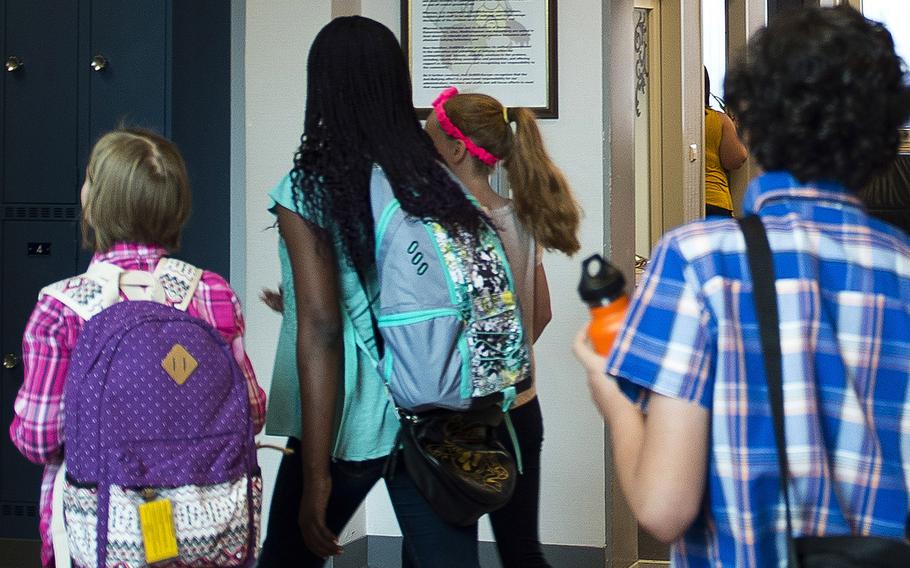
Students move between classes during the first day of school at a Department of Defense Education Activity school in 2017. Civilian dependents who are sexually victimized by fellow students at Defense Department schools can’t get mental health treatment and other needed services through the military, according to a Government Accountability Office report released Feb. 13, 2024. (Stars and Stripes)
Children who are sexually victimized by fellow students at on-base schools can’t get counseling and needed services through the military if their parents are civilians, a treatment gap that may put them and others at risk, a government watchdog agency said.
The disparity shuts out thousands of Department of Defense Education Activity students from DOD case management and treatment plans that the children of active-duty service members receive if they’re subjected to harmful sexual behavior in school, according to a Government Accountability Office report released Tuesday.
Those behaviors include bullying or coercing others to send sexual content, taking sexual photos of others to exploit them and sexual assault, according to the report.
The dependents of civilian workers also don’t qualify for counseling and services when they harm other students. And few of the military’s Family Advocacy Program clinicians are qualified to work with youths who may be victimizing others, despite DOD requirements, the report stated.
The restriction is the result of a Military Community Advocacy Directorate decision to make such services solely available to military dependents.
That determination leaves “nearly one in five DODEA students who are civilian-dependent with limited options for treatment,” the GAO said.
A lack of immediate, trauma-informed clinical services hurts students, who may be experiencing depression or thinking of harming themselves.
Qualified clinicians who offer immediate intervention services can help break the cycle of problematic sexual behaviors, the report stated.
“Children and youth exhibiting these behaviors can continue to harm, disrupt school climate, and pose safety concerns to themselves and others,” the GAO said.
The GAO recommended that DOD evaluate the impact of the restriction on the well-being of children attending DODEA schools.
The report also said the military should better monitor efforts to train clinicians.
“Without addressing these weaknesses, DOD risks ongoing challenges in ensuring that students who are harmed by or exhibit problematic sexual behavior receive the support needed to assure the safety of the DODEA community,” the GAO said.
DOD concurred with both recommendations.
The GAO study was conducted from August 2022 through February 2024 and included visits to 11 schools.
The areas visited were Fort Liberty and Camp Lejeune in North Carolina, and three overseas: Kaiserslautern/Ramstein and Stuttgart in Germany, and Vicenza in Italy.
The study also included a review of unwanted sexual behavior reports at DODEA schools.
Researchers found that a sizeable number of DODEA students were dependents of civilians. Most live overseas, where barriers to treatment are profound due to cultural and language barriers, few qualified professionals, and long waitlists and commutes for care.
For example, 29% of the 24,850 students attending DODEA schools in Europe are civilian dependents. There are 66,000 students attending DODEA schools worldwide, predominantly in Europe and the Asia-Pacific region, according to the report.
One clinician working for the military said that counterparts working locally off-base “do not have the expertise or experience needed to treat students yet advertised themselves as a legitimate source of care,” the report stated.
Unwanted sexual behaviors are classified in three categories: normative but inappropriate, cautionary and problematic. They include actions ranging from unwanted touching to sexual assault.
Problematic sexual behaviors, which can involve assault, warrant corrective action and support, the report stated.
In analyzing the severity of incidents reported at DODEA schools from March through May 2023, the GAO found “the large majority of the 154 reported contact sexual acts were classified as cautionary or problematic.”
The researchers acknowledged that DOD had taken steps to better support students affected by problematic sexual behaviors. But it should improve how it assesses efforts to build up low participation in family advocacy services, they said.
The GAO also said that the Pentagon should have DODEA review the unwanted sexual behavior reporting process, especially when it came to the time spent investigating, and the stigma associated with normative sexual behavior incidents.
DOD partially concurred with that recommendation, saying it could improve methodologies but would remain committed to protecting students against “unwelcome and offensive conduct of a sexual nature, even if technically an act is classified as normative for the age and development level of the student exhibiting this behavior.”